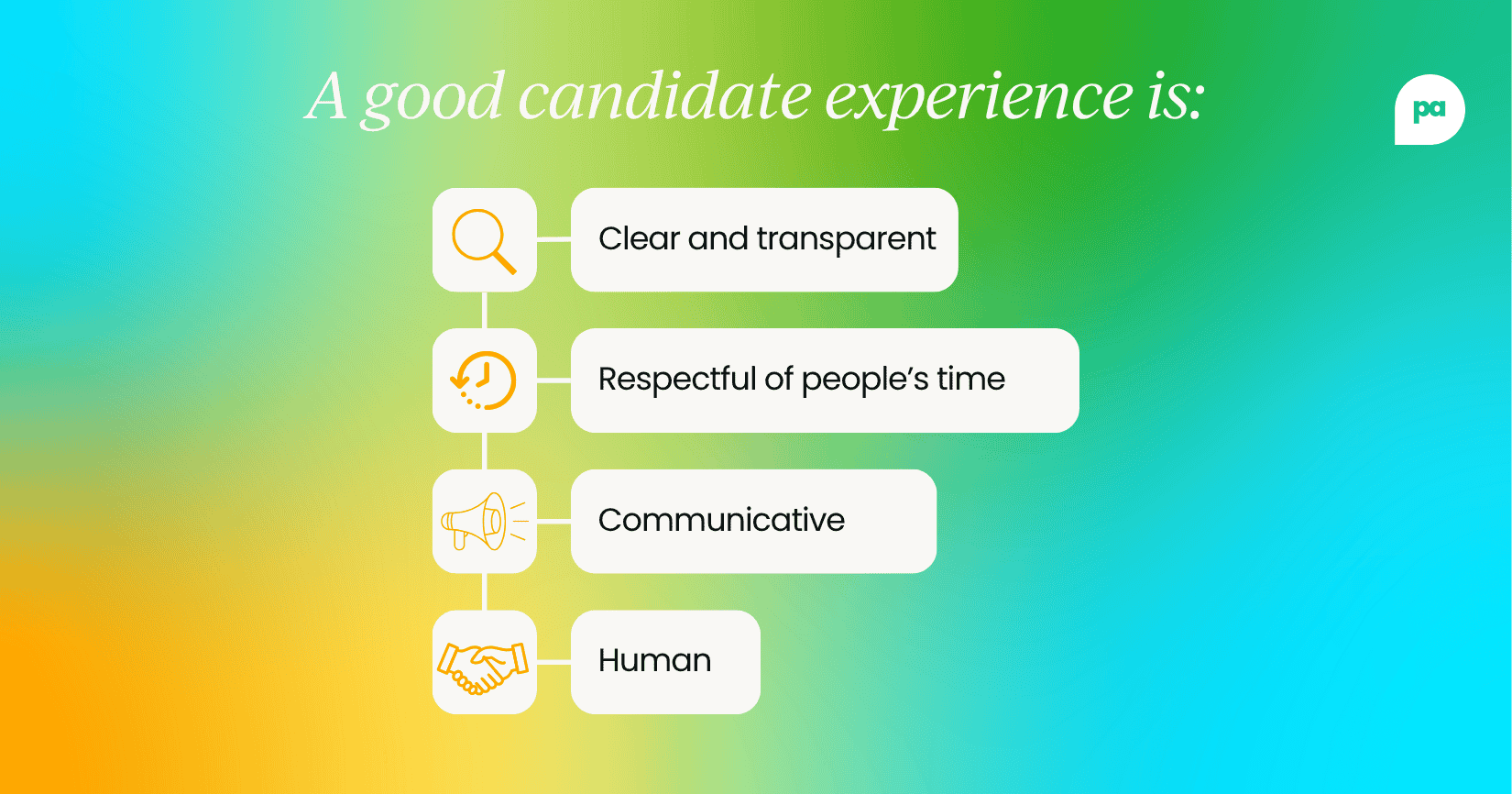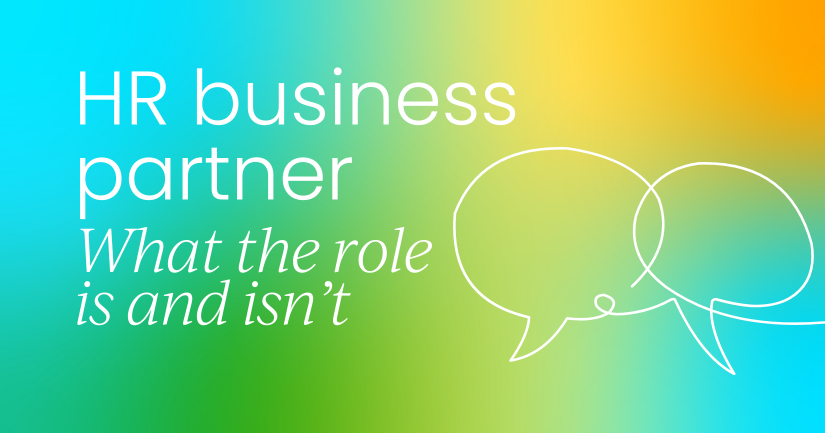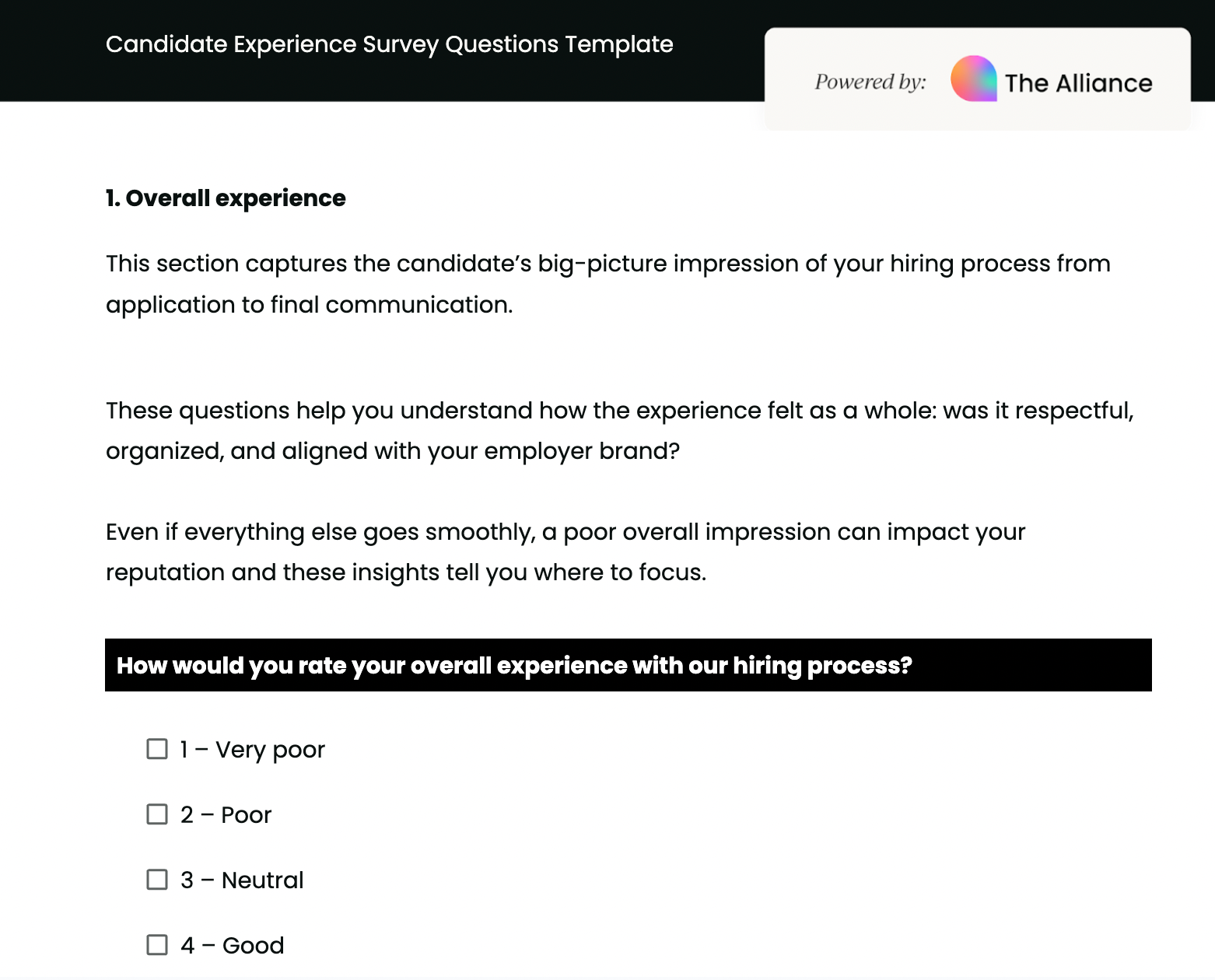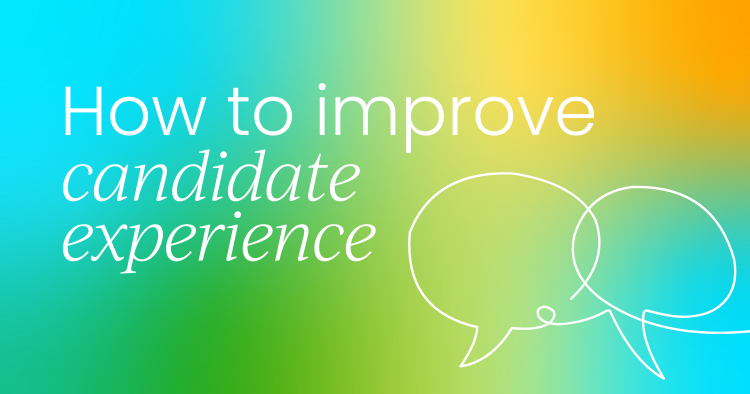Every interaction shapes how candidates perceive your company. Things like confusing applications, ghosted emails, and awkward interviews can damage your reputation.
That’s why candidate experience matters. A lot.
It’s not just about making people feel good (though that’s part of it). It’s about building trust, showing who you are as an employer, and giving every applicant (hired or not) a reason to speak positively about your brand.
In this guide, we’ll break down why candidate experience has become mission-critical, what a “good” experience actually looks like, candidate experience survey questions, and more.
What is candidate experience?
The candidate experience refers to everything a person goes through when they apply for a job at your company. From the first “We’re hiring!” post they see to the final “Congrats” (or “Thanks but not this time”) email, every touchpoint counts.
It’s the application process, the interviews, the way you communicate, and even how you don’t communicate.
Candidate experience is the full journey and the emotions that come with it.
Why is candidate experience important?
People talk. Nowadays, and partially thanks to social media, candidates are more connected (and vocal) than ever. A clunky, confusing, or dismissive hiring process doesn’t just frustrate the person on the receiving end, it can turn into a horrible Glassdoor review, a viral LinkedIn post, or just a bad word-of-mouth story passed around over coffee. ☕️
On the flip side?
A thoughtful, respectful, and clear process (even for people who don’t get the job) can leave a lasting and positive impression. It builds trust and shows your company values people, not just resumes.
Better experience = better applicants, faster hires, stronger teams.
What a good candidate experience can look like
A great candidate experience isn’t about fancy perks or over-the-top welcome videos. You’ll get a lot further with candidates by simply providing clarity, respect, and maybe not leaving people in the dark. It’s the kind of process that makes someone think, “Even if I don’t get this job, I’d still recommend this company to a friend.”

A good candidate experience is:
Clear and transparent
Candidates should know what to expect, what the steps are, and how long things might take. No mystery timelines. No ghosting. Just clear, honest communication.
Respectful of people’s time
Whether it’s a 5-minute application (not 45), or interviewers showing up on time and prepared, the process doesn’t waste anyone’s time or energy.
Communicative
Even a quick “We’re still reviewing applications” email can go a long way. Silence = stress. Keep candidates in the loop.
Human
People want to feel like they’re more than a resume. That means warm interactions, thoughtful questions, and interviewers who listen, not just talk.
Oh, and they almost always end with closure. So, whether it’s an offer or a “not this time,” candidates deserve closure. A simple, kind rejection email is way better than silence.

How to measure candidate experience
It’s one thing to say you care about candidate experience, but how can you actually measure it?
The best way to find out is to simply ask.
You don’t need to guess how candidates felt about your hiring process. With a simple, well-timed survey, you can gather real feedback straight from the source. That data helps you understand what’s working, what’s broken, and where to improve.
Grab our free, ready-to-use Candidate Experience Survey Template and start getting honest feedback that actually improves your hiring process!

6 candidate experience metrics worth tracking
But surveys are just part of the picture.
You’ll also want to track a few key metrics to get a full view (both qualitative and quantitative) of how candidates experience your hiring process. Here are six candidate experience metrics to think about measuring:
1. Candidate Satisfaction Score (CSAT)
This is the direct feedback you get from your candidate surveys. It’s often just a quick “How satisfied were you with your experience?” on a 1–5 scale type question. It’s simple, but it gives you a snapshot of how people are feeling overall.
2. Net Promoter Score (NPS)
This asks: “How likely are you to recommend applying to our company to someone else?” It reveals how your process impacts word-of-mouth which, in hiring, is a big deal.
3. Time-to-respond / Time-to-feedback
How quickly do you follow up with candidates after each stage, especially interviews? Long silences are one of the top frustrations in hiring. This metric helps you keep your comms tight and timely.
4. Time-to-hire
While this one’s not just about candidate experience, it’s a good pulse check. If your process is dragging out for weeks (or months), chances are candidates are feeling it too.
5. Offer acceptance rate
A low acceptance rate might mean your process didn’t sell the opportunity well or turned candidates off before the finish line. If people say “no” after you say “yes,” it’s worth digging into the why.
6. Drop-off rate
How many people start applying but never finish? Or ghost you some time in the mid-interview process? These drop-offs often signal friction in the experience such as confusing steps, bad communication, or lost trust.
Collecting these metrics consistently gives you a real-world view of how your hiring process feels from the other side. And once you know that, you can start improving the right things instead of simply guessing.

Candidate experience survey questions
A candidate experience survey is a great way to know how candidates feel when applying or interviewing for a role with your company. However, the candidate experience survey questions are tricky to get right.
If the survey feels too long, too generic, or too much like a chore, most people won’t bother. The goal isn’t just to ask questions. It’s to ask the right ones, at the right time, in a way that makes candidates feel like their input actually matters.
The best surveys are:
- Short and focused (think five to 10 questions max)
- Easy to answer (mix of ratings and a few open-ended Qs)
- Timed right (sent soon after the interview or decision)
And most importantly, they’re framed in a way that says: We care about your experience, and we want to get better.
So, let’s take a look at some candidate experience survey questions worth including:
General satisfaction
On a scale of 1–5, how would you rate your overall experience with our hiring process?
How likely are you to recommend applying to our company to a friend or colleague? (NPS)
What words would you use to describe your experience in one sentence?
Communication & clarity
Did you feel informed about what to expect at each stage?
How would you rate the communication you received during the process?
Was the information about the role and company clear and accurate?
Efficiency & respect for time
Was the application/interview process efficient and respectful of your time?
How would you rate the length of the hiring process?
Interview experience
Did your interviewer(s) make you feel heard and respected?
Were the interview questions fair and relevant to the role?
Final thoughts
If you didn’t receive an offer, did you feel the rejection was handled respectfully?
Is there anything we could have done to improve your experience?
Download our candidate experience survey template
We’ve put together a plug-and-play candidate experience survey template you can start using today. Just copy, customize, and start collecting the feedback that actually helps you hire better.



 Follow us on LinkedIn
Follow us on LinkedIn


